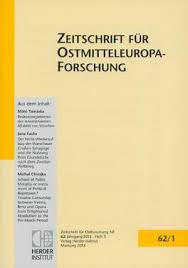„an die besten Traditionen der Ersten und Zweiten Republik anknüpfend“ : Polnische Erinnerungskultur im öffentlichen Raum nach 1989
“linking up with the best traditions of the First and Second Republics”. Polish culture of memory in public space after 1989
Author(s): Heidi Hein-KircherSubject(s): Government/Political systems, Post-War period (1950 - 1989), Transformation Period (1990 - 2010), Politics of History/Memory
Published by: Verlag Herder-Institut
Keywords: best traditions; First and Second Republics; Polish culture of memory; public space after 1989;
Summary/Abstract: In the early years of what is generally known as the Third Republic, which was brought to an end by the 1997 Constitution, the politics of history and memory reflected the new Polish society’s search for a fresh conception of itself, a conception that would displace that of communist times. To this end a specific effort towards the creation and search for historical continuities was characteristic of this stage: new and renewed national themes, new and renewed rituals, symbols and political myths formed important elements in political psychology and political culture. These were not only used to create a new identity, but also to legitimise the revolution and the new political system. As will be shown, the historical memory of the Second Republic, in particular of its founder and dictator Józef Piłsudski, as well as of the (negatively perceived) Soviet occupation and hegemony over Poland, became the focus of the politics of memory in public discourse. In this process, the problematic history of German-Polish relations was all but excluded, in order to build up a new, positive national image, as well as from political necessity, in the efforts to join NATO and the EU. The memory of the German crimes committed during the Second World War was now – in contrast to position in the communist era – just one element in historical consciousness and collective memory. Hence the culture of memory as a whole was characterised on the one hand by linking up with the historical traditions of the Second Republic, and on the other by attempts to remove the boundaries to the culture of memory set under communism. Thus the change in the culture of memory reflects political change, i.e. the change of system, as Poles were now able to set their own markers in the culture of memory. Since the end of the 1990s, it has become ever clearer that what was really happening was a form of suppression of historical memory, especially with regard to German-Polish relations.
Journal: Zeitschrift für Ostmitteleuropa-Forschung
- Issue Year: 59/2010
- Issue No: 3
- Page Range: 344-365
- Page Count: 22
- Language: German

